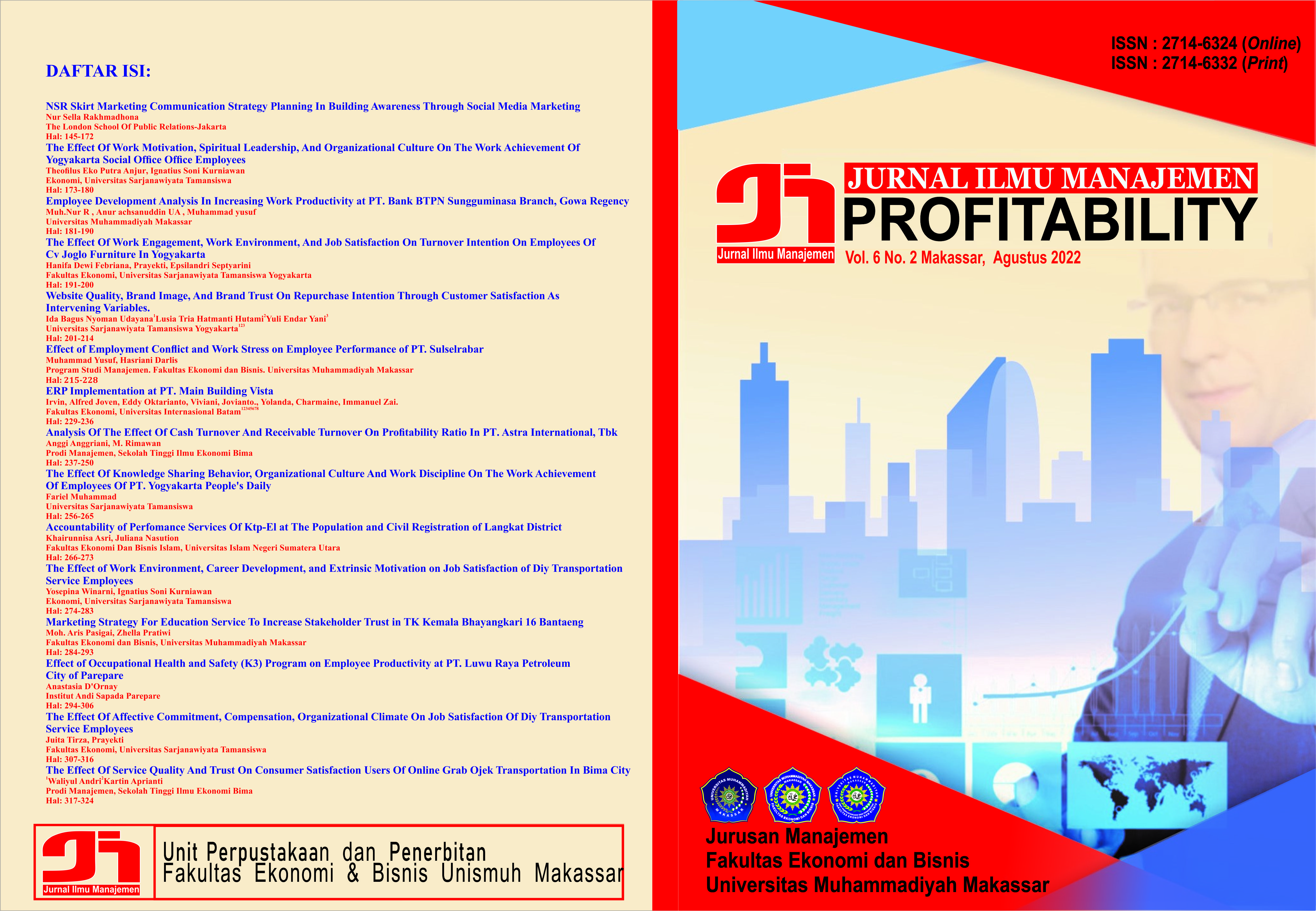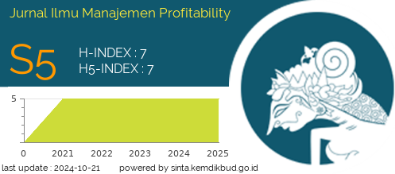Start-Up Ecosystem in Makassar: Determinants of Success and Challenges Faced
DOI: https://doi.org/10.26618/bybpf355
Makassar start-ups, digital ecosystem, technology entrepreneurship, regional innovation, digital economy.
Abstract
This study aims to examine the development of the start-up ecosystem in Makassar City, focusing on the factors that influence success and the challenges faced by start-up actors. Using mixed methods, this study combines qualitative data analysis of 30 local start-ups and in-depth interviews with various stakeholders, such as start-up founders, investors, local government, as well as communities and incubation centers. The results show that access to capital, support from local government, and the quality of human resources are key success factors for start-ups, while key challenges include limited digital infrastructure and difficulty accessing broader markets. The practical implications of these findings include the need to improve access to capital through partnerships with investors and more affordable funding programs, the development of equitable digital infrastructure to support access and service quality, and human resource training to strengthen technical and managerial skills. In addition, there needs to be support to help start-ups access regional and national markets through collaboration with local governments and joint promotions, in order to expand market reach and improve the competitiveness of start-ups in Makassar. With these steps, the start-up ecosystem in Makassar can further develop and have a positive impact on the local economy
References
Adella. (2023). Industri Start Up Dianggap Sebagai Pasar yang Tumbuh dan Masih Diminati Oleh Investor. Universitas Gadjah Mada, Fakultas Ekonomika Dan Bisnis. https://feb.ugm.ac.id/id/berita/4227-industri-start-up-dianggap-sebagai-pasar-yang-tumbuh-dan-masih-diminati-oleh-investor
Aras, R. A., Sucipto, K. R. R., & Sari, E. P. (2021). Faktor Keberhasilan Start-Up Di Makassar. JMBI UNSRAT (Jurnal Ilmiah Manajemen Bisnis Dan Inovasi Universitas Sam Ratulangi)., 8(3), 910–920. https://doi.org/10.35794/jmbi.v8i3.36757
Aruni, S. F., & Hidayat, R. (2019). Psikologi Peluang Kewirausahaan: Proses Kognitif Pengusaha Startup Digital dalam Opportunity Recognition. Jurnal Psikologi, 46(1), 45. https://doi.org/10.22146/jpsi.34608
Adella, F. (2023). Access to finance and start-up development in Indonesia. Jakarta: Ministry of Cooperatives and SMEs.
Aras, A., Rahman, F., & Yusuf, M. (2021). The role of regional hubs in Indonesia’s digital economy: Evidence from Makassar. Journal of Entrepreneurship and Development Studies, 9(2), 55–70.
Aruni, F., & Hidayat, S. (2019). Bureaucratic challenges in Indonesian start-up ecosystems. Journal of Policy and Management Review, 8(1), 23–35.
Asosiasi E-Commerce Indonesia. (2023). E-commerce outlook Indonesia 2023. Jakarta: idEA.
Autio, E., Nambisan, S., Thomas, L. D. W., & Wright, M. (2018). Digital affordances, spatial affordances, and the genesis of entrepreneurial ecosystems. Strategic Entrepreneurship Journal, 12(1), 72–95.
Balai Diklat Industri Makassar. (2023). Laporan pengembangan ekosistem start-up di Indonesia Timur. Makassar: Ministry of Industry.
Bau Massepe, H. (2018). Barriers to innovation in Eastern Indonesia start-ups. Indonesian Journal of Business and Economics, 15(3), 101–112.
BPS Makassar. (2024). Makassar dalam angka 2024. Badan Pusat Statistik Kota Makassar.
Balai Diklat Industri Makassar. (2023). Laporan inkubator bisnis 2023. BALAI DIKLAT INDUSTRI MAKASSAR BADAN PENGEMBANGAN SUMBER DAYA MANUSIA INDUSTRI KEMENTERIAN PERINDUSTRIAN.
Bau Massepe, A. N. (2018). STARTUP di Makassar sebuah eksplorasi awal Pendahuluan. May, 2–6.
Fatmawaty, A. S., Widigdo, A. M. N., Ie, M., Jumintono, Karlinah, Lady, Julitasari, E. N., Hairani, E., & Muttaqiyathun, A. (2023). Improving Smes Innovative Work Behavior: How the Role of Transformational Leadership and Knowledge Sharing in the Digital Era. Journal of Law and Sustainable Development, 11(3), 1–20. https://doi.org/10.55908/SDGS.V11I3.735
Fatmawaty, S., Idris, M., & Bahar, A. (2023). Institutional support and innovation challenges for start-ups in Eastern Indonesia. Journal of Regional Innovation Studies, 7(1), 14–28.
Firman, R., Rasyid, A., & Nur, H. (2023). Survival analysis of Indonesian start-ups: A regional perspective. Journal of Economics and Business Research, 12(4), 212–227.
Firman, Y. F., Halim, A., & Hidayat, R. (2023). Strategi Komunikasi Dinas Komunikasi Dan Informatika (Diskominfo) Kota Makassar Dalam Upaya Menyukseskan Program Makasar Recover. CORE: Journal of Communication Research, 1–10. https://journal.unpacti.ac.id/CORE/article/view/700%0Ahttps://journal.unpacti.ac.id/CORE/article/download/700/358
Isenberg, D. J. (2011). The entrepreneurship ecosystem strategy as a new paradigm for economic policy: Principles for cultivating entrepreneurship. Institute of International and European Affairs, 1(781), 1–13.
Indonesia, A. E.-C. (2023). idEA Audience with the Coordinating Ministry for Economic Affairs. IDEA Asosiasi E-Commerce Indonesia. https://idea.or.id/artikel/audiensi-idea-dengan-kementerian-koordinator-bidang-perekonomian?lang=undefined
Kartawaria, J. R., & Normansah, A. C. (2023). Penerapan Digital Marketing Sebagai Strategi Pemasaran Perusahaan Start-Up. Jurnal Ilmiah Ilmu Komunikasi Komunikata, 4(1), 21–29. https://doi.org/10.55122/kom57.v4i1.748
Mason, C., & Brown, R. (2014). Entrepreneurial ecosystems and growth-oriented entrepreneurship. Final Report to OECD LEED Programme. Paris: OECD.
Mahyuni, L. P., & Rinaldi, V. (2022). Exploring key success factors of sustainable start-up business. Jurnal Ekonomi Dan Bisnis, 25(2), 237–252. https://doi.org/10.24914/jeb.v25i2.3046
Makassar, B. (2024). Jumlah Penduduk Menurut Kecamatan dan Jenis Kelamin di Kota Makassar (Jiwa), 2022-2023. Badan Pusat Statistik Kota Makassar. https://makassarkota.bps.go.id/id/statistics-table/2/NzIjMg==/jumlah-penduduk-menurut-kecamatan-dan-jenis-kelamin-di-kota-makassar.html
Mushlimah, N., Jusriadi, E., Romadhoni, B., Manajemen, M., & Muhammadiyah Makassar, U. (2022). Analisis Pertumbuhan Bisnis Startup Techno Digital Pada Masa Pandemi Covid-19 di Kota Makassar. SEIKO : Journal of Management & Business, 4(1), 2022–2111. https://doi.org/10.37531/sejaman.v5i1.1852
Nadhifah, A. (2023). Menggali potensi startup di Makassar dan Pontianak. Techinasia. https://id.techinasia.com/menggali-potensi-startup-makassar-pontianak
Prasetiyo, S. M., Gustiawan, R., Faarhat, & Albani, F. R. (2024). Analisis Pertumbuhan Pengguna Internet Di Indonesia. Jurnal Buletin Ilmiah Ilmu Komputer Dan Multimedia , 2(1), 65–71. https://jurnalmahasiswa.com/index.php/biikma
Prasetiyo, D., Lestari, I., & Munir, A. (2024). Digital infrastructure and start-up growth in Indonesian secondary cities. Journal of Information Systems and Development, 15(1), 56–73.
Spigel, B. (2017). The relational organization of entrepreneurial ecosystems. Entrepreneurship Theory and Practice, 41(1), 49–72.
Downloads
Published
Issue
Section
License
Authors who publish with Jurnal Ilmu Manajemen Profitability agree to the following terms:
Copyright of the articles remains with the authors.
Authors grant the journal the right of first publication with the work simultaneously licensed under a Creative Commons Attribution-NonCommercial 4.0 International License (CC BY-NC 4.0). This license allows others to:
Share (copy and redistribute the material in any medium or format)
Adapt (remix, transform, and build upon the material)
as long as they give appropriate credit to the original author(s) and source, provide a link to the license, and indicate if changes were made. Non-commercial use only.
Authors are permitted to:
Distribute their published work (e.g., post it to an institutional repository or publish it in a book), with an acknowledgment of its initial publication in this journal.
Enter into separate, additional contractual arrangements for the non-exclusive distribution of the journal’s published version of the work (e.g., post it to a class website or institutional archive).
For permissions to use the content published in this journal beyond the scope of the license (e.g., commercial purposes), please contact the editorial office via the journal email.
License Details:
This journal is licensed under a Creative Commons Attribution-NonCommercial 4.0 International License (CC BY-NC 4.0).












